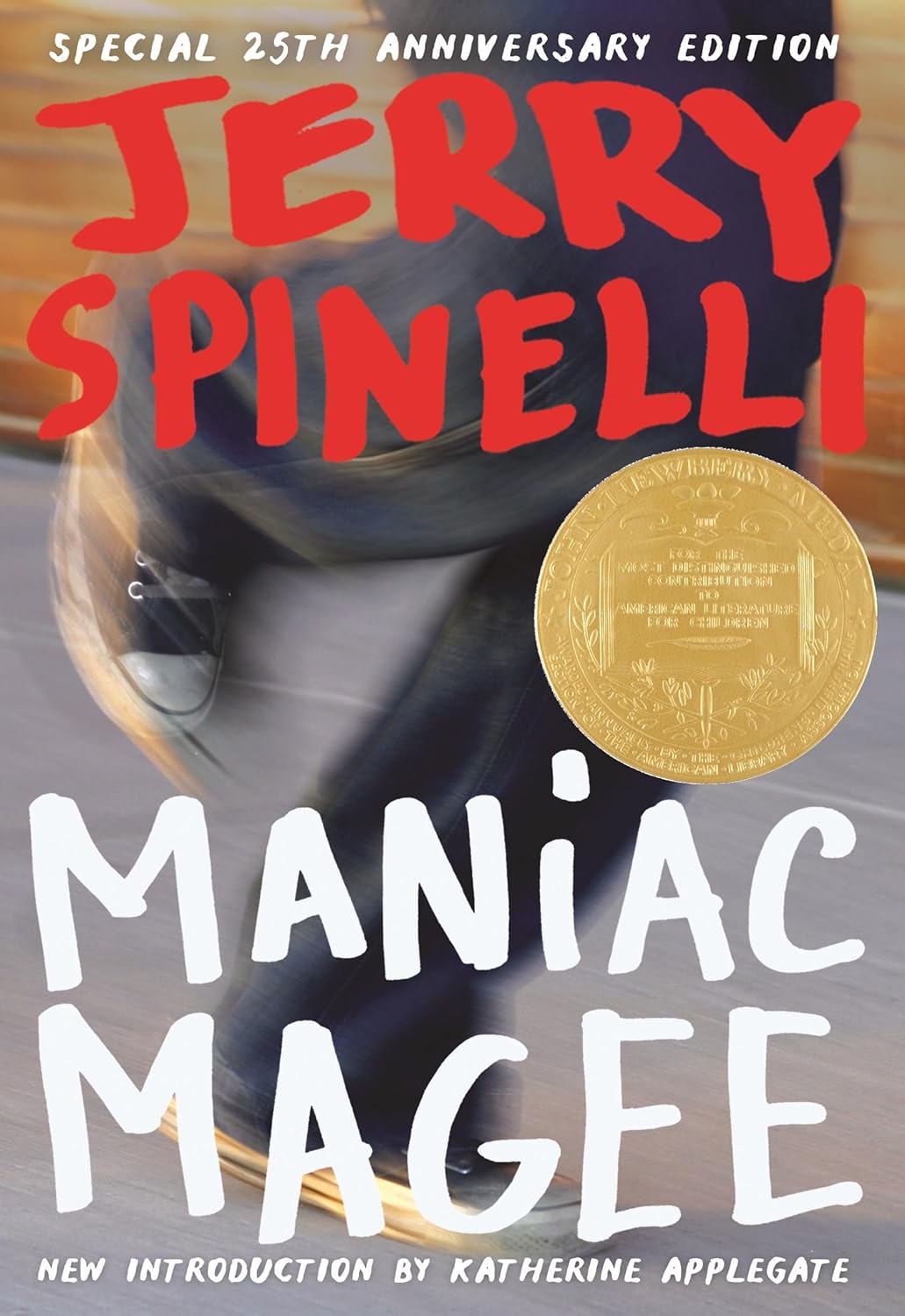
Maniac Magee
Chapter 6
by Spinelli, JerryThe chapter opens with Mrs. Valerie Pickwell summoning her large family to dinner with her distinctive two-note whistle, a sound uniquely effective to her children. Despite its simplicity, the whistle cuts through the noise of the neighborhood, ensuring all ten Pickwell kids return home promptly. The narrative highlights the warmth and chaos of the Pickwell household, which includes extended family and even a down-and-out taxi driver they’ve taken in. Their dinner gatherings are so expansive that they require a Ping-Pong table to accommodate everyone, with spaghetti being a frequent meal choice.
During dinner, the family realizes an unfamiliar boy has joined them at the table, though no one seems to know who he is or how he arrived. The children’s confusion grows as each denies knowing the mysterious guest, with playful banter suggesting he might be Deirdre’s new boyfriend. By the time they notice his absence, the boy has already left, prompting the Pickwell kids to rush outside in search of him. The sudden appearance and disappearance of the boy add an element of intrigue to the otherwise routine family dinner.
The children spot the boy running along the railroad tracks, but what astonishes them is his ability to run effortlessly on the steel rail itself—a feat none of them have ever attempted. The boy’s unusual skill and the book he carries hint at his extraordinary nature, leaving the Pickwell kids in awe. The scene captures the contrast between the boy’s seemingly supernatural abilities and the ordinary, bustling life of the Pickwell family.
The chapter subtly introduces the enigmatic figure of the boy, later revealed to be Maniac Magee, through the eyes of the Pickwell children. His brief appearance and remarkable actions foreshadow his unique role in the story. The Pickwells’ reactions—curiosity, confusion, and wonder—emphasize the boy’s mystique, setting the stage for his larger significance in the narrative. The chapter blends everyday family dynamics with a touch of the extraordinary, creating a memorable and engaging moment.
FAQs
1. What made Mrs. Pickwell’s whistle so effective at gathering her children for dinner?
Answer:
Mrs. Pickwell’s whistle was remarkably effective due to its unique two-note composition (one high, one low) and its magical ability to cut through the typical five o’clock noise. Though it wasn’t loud or screechy, it had a special quality that resonated with her children, ensuring they always arrived on time for dinner. The text emphasizes that this whistle was so distinctive to the Pickwell kids that it became an unbreakable tradition, with no child ever missing dinner—a record likely to stand forever.
2. How does the description of the Pickwell family dinner highlight their household dynamics?
Answer:
The dinner scene illustrates the Pickwells’ chaotic yet warm family life. With ten children, extended family members, and even a down-and-out taxi driver they were helping, their home is described as a “small nation.” The use of a Ping-Pong table as a dining table and the regularity of spaghetti (every third night) suggests both practicality and a sense of routine amid the bustle. The family’s inclusivity and generosity are also evident, as they frequently assist others in need.
3. What is significant about the way Maniac Magee is first noticed and then leaves the Pickwell household?
Answer:
Maniac’s appearance at the dinner table is almost ghostlike—none of the Pickwell kids seem to know who he is, each assuming another sibling invited him. His sudden disappearance and the children’s realization that he was gone underscores his elusive, mysterious nature. The fact that he was reading a book while effortlessly running on the steel rail (a feat no other child could do) further establishes his extraordinary abilities and reinforces his legendary status in the story.
4. Why might the author have chosen to include the detail about Maniac running on the railroad rail?
Answer:
This detail serves to emphasize Maniac Magee’s almost mythical athleticism and fearlessness. While other children only walk carefully on the rail, Maniac runs effortlessly, defying expectations. This moment not only astonishes the Pickwell kids but also symbolizes Maniac’s ability to navigate life’s challenges with uncanny ease. It foreshadows his larger role as a figure who transcends ordinary limitations, making him a legend in the town.
5. How does the chapter use humor to depict the Pickwell family’s interactions?
Answer:
Humor arises from the siblings’ confusion over Maniac’s presence, with each child blaming another for inviting him (“I thought Donald knew him,” “I figured he was Deirdre’s new boyfriend”). Deirdre’s violent reaction (kicking Dion in the shins) adds a playful, chaotic energy. The exaggerated description of Mrs. Pickwell’s “small nation” and the spaghetti-every-third-night routine also contribute to the lighthearted, affectionate portrayal of their hectic but loving household.
Quotes
1. “As whistles go, Mrs. Pickwell’s was one of the all-time greats. It reeled in every Pickwell kid for dinner every night. Never was a Pickwell kid ever late for dinner.”
This quote highlights the magical quality of Mrs. Pickwell’s whistle and its significance in maintaining family routine, showcasing the Pickwell family’s unique dynamics through this small but powerful detail.
2. “Somehow it had the ability to slip through the slush of five o’clock noises to reach its targets.”
This passage poetically describes the almost supernatural effectiveness of Mrs. Pickwell’s whistle, emphasizing how family signals can cut through daily chaos to maintain connection and order.
3. “Only a Ping-Pong table was big enough to seat them all, and that’s what they ate around. Dinner was spaghetti. In fact, every third night dinner was spaghetti.”
This humorous observation captures the Pickwell family’s size and quirky, predictable routines, painting a vivid picture of their crowded but functional household.
4. “No, he was running — running — where the Pickwells themselves, where every other kid, had only ever walked — on the steel rail itself!”
This climactic quote reveals Maniac Magee’s extraordinary abilities through the amazed perspective of the Pickwell children, marking a key moment where his legendary status begins to form in their eyes.
